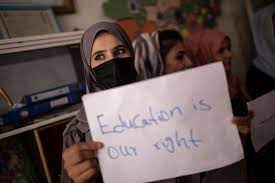One out of two people, mainly women, suffer through psychological agony, even before the Taliban take over in 2021

Image source: Human Rights Watch
A young woman, in her early twenties, tried to end her life the Taliban government restricted female students from attending university. She is now being handled by a psychologist.
Most girls in her class have suicidal thoughts and suffer from depression or anxiety, she said.
Her words shed light on the less visible yet pressing health crisis facing Afghanistan.
An Afghan psychologist says they face a pandemic of suicidal thoughts, but the world rarely thinks or talks about it. The news covers aspects like the hunger crisis, but the topic of mental health issues never comes up. It’s like people are slowly getting poisoned, they lose hope every passing day.
The same psychologist says she received about 170 calls for help, in two days after the announcement that women can’t attend university. Now the numbers have trickled down to 7-10, most of the callers being girls and young women.
In Afghan’s deeply patriarchal society, which has been through four decades of war, the UN estimates that one out of two people, mostly women, suffered from psychological distress even before the Taliban took over in 2021. Things are worse now because of the clamps on freedom for women, and the economic crisis in the country.
https://twitter.com/HabibKhanT/status/1665927524847611909?s=20
A school teacher says she lost her job when they shut down universities for women. She was the breadwinner for the family, and now it was difficult for her to cope financially as well as mentally. She tried to end her life because she felt extremely confused, with no goals or hopes for the future.
A study done in Herat province by the Afghanistan Center for Epidemiological Studies showed that two-thirds of Afghan adolescents reported symptoms of depression. The UN has raised an alarm over the extensive psychological issues and rising suicide accounts.
The Taliban say they are not recording suicide numbers, neither did they respond to any questions about the rise in figures.
In such absence of data, journalists have to go ask people affected if they want to talk about it.
Not just women, men are quite affected by this. In Afghanistan, men are brought up to believe they need to be powerful. But right now, these Afghan men cannot raise their voices or provide financially for their families and take care of them. It really affects them.
Unfortunately, because of their plotting, men are significantly more successful in their attempts at committing suicide.
In such an environment, the best way to help others or yourself is by not isolating yourself. Doctors suggest people go talk to friends, go meet a neighbour, and form a support team for themselves, even if it is with their parents and siblings.
These stories about girls and young women unable to cope with their lives and their future coming to a halt are heartbreaking.













